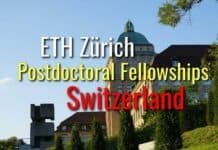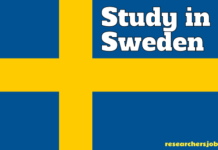PhD Studentship in Decoding and Mapping: The McFadden Lab at Queen Mary University of London is offering a fully-funded 4-year PhD studentship for aspiring researchers to explore the intersections of ecology, artificial intelligence (AI), and conservation biology. This opportunity provides a platform to investigate important ecological interactions and apply innovative AI techniques to understand and conserve biodiversity.
PhD Studentship in Decoding and Mapping Earth’s Species Interactions with Artificial Intelligence
Designation
PhD Studentship in Decoding and Mapping Earth’s Species Interactions with Artificial Intelligence
| Details | Information |
|---|---|
| Research Area | Ecology, Artificial Intelligence, Conservation Biology |
| Location | Queen Mary University of London |
| Eligibility/Qualification | First or upper-second class honours degree, Master’s degree in biology, ecology, or data science |
| Funding | Fully-funded, China Scholarship Council (CSC) |
| Last Date to Apply | 29th January 2025 |
Research Area
The research will focus on:
- Understanding ecological interactions through AI systems using computer vision and multi-modal approaches.
- Analyzing the global patterns of species interaction diversity and assessing major threats to these patterns.
Location
Queen Mary University of London, with potential collaborations with renowned institutions like Kew Gardens, Natural History Museum, and Alan Turing Institute.
Eligibility/Qualification
- Candidates must hold or expect to receive:
- A first or upper-second class honours degree.
- A Master’s degree in a relevant field such as biology, ecology, or data science.
- Preference for candidates with knowledge of ecology, species interactions, data science, R programming, global mapping, computer vision, and/or machine learning.
Description
The PhD project will take place within the interdisciplinary research environment of the McFadden Lab, allowing for ample training in R coding, data synthesis, computer vision, and global mapping. Prospective students should express their interest in one or both of the specified research questions in their application.
How to Apply
- Formal applications must be submitted through the online application form by 29th January 2025.
- Applicants should identify as a ‘CSC Scholar’ in the funding section of the application.
- Required documents include:
- CV
- Personal Statement
- Evidence of English Language (e.g., IELTS Certificate)
- Copies of academic transcripts and degree certificates
- References
For informal inquiries, contact Dr. Ian McFadden at i.mcfadden@qmul.ac.uk. For admissions-related queries, contact sbbs-pgadmissions@qmul.ac.uk.
Last Date to Apply
29th January 2025
This PhD studentship presents an exciting opportunity for candidates who are passionate about ecological research and eager to leverage AI technologies for conservation efforts.







